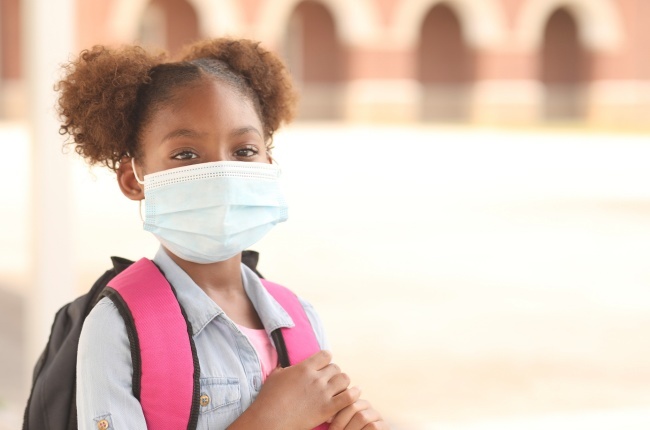


A girl wears a mask to school to help protect her against Covid-19.
The blanket closure of public schools is to the detriment of millions of children who are deprived of an education and social interaction, writes Adriaan Basson.
There is a worrying trend developing in South Africa, sharply highlighted by the nonsensical decision to close public schools again last week.
It seems as if some public servants believe they are entitled to some kind of special protection against being exposed to the coronavirus. This is a dangerous development that has the potential to completely paralyse the civil service and, by implication, the economy, if left unchecked.
Unfortunately, President Cyril Ramaphosa has buckled under the pressure from teachers’ unions to close schools versus clear advice from the country’s scientists, through the ministerial advisory committee, that schools should remain open.
One of the miracles of the devastating global pandemic is the fact that children are largely not at risk. The majority of scientists, doctors and paediatricians agree that it is safe for children to return to school.
South Africa, like many other countries around the world, has instituted a strict hygiene regime at schools before they can reopen. Everyone wears masks, sanitiser should be frequently available, and social bubbles or groups keep interaction between children and teachers to a limit.
Of course, teachers are at risk of contracting the virus, but so are most of us who must continue to function in this Covid-19 world. Teachers over 60 are advised not to return to school and those with underlying comorbidities should in anyway not be exposed.
Blanket closure
But without any evidentiary proof, a blanket closure of schools was now approved by Ramaphosa and his Cabinet, to the detriment of the development and mental health of millions of children who are deprived of an education and social interaction.
Private schools will continue to function, entrenching the already deep divide between those who can pay extra for a quality education and those who can’t.
There is simply no indication that South Africa is at the peak of our coronavirus curve. To say children must “take a break” for a week or four was deeply insensitive and illogical of Ramaphosa.
The first time schools closed down, we were nowhere near our peak. What happens in four weeks if the curve hasn’t started to dip?
Cosatu and its affiliated trade unions have been a major ally of Ramaphosa from before his election as ANC president in December 2017. This was purely a political decision from a president who didn’t have the conviction to stand up for science against populistic demands by his supporters, the trade unions.
Unfortunately, this behaviour is not limited to the teaching profession. Major deeds offices, including those in Pretoria and Cape Town, have barely been functioning since the lockdown started.
In Cape Town, business organisations had to get a court order to force the reopening of the deeds office to be able to process property transactions. Employees simply refused to work at the slightest whim of being “exposed” to the virus.
An Eastern Cape doctor wrote to News24 a few weeks ago, complaining of the interference of health workers’ unions in allowing hospitals to function. The notion of being “exposed” to someone with Covid-19, even if both persons were wearing masks and physical distancing was observed, was used to the extreme and led to hundreds of nurses and hospital workers not working during the province’s peak period.
Active participants
If we want this country to survive Covid-19, all of us, including civil servants and their unions, will have to find a way to manage risk that protects our health, but allows us to continue being active participants in the world.
Millions of South Africans are getting into taxis, trains, buses and cars every day to earn a salary, that has likely been cut. They are making plans, hustling to make ends meet, pay the bills and provide food for their children.
They wear their masks, wash their hands and keep a safe distance.
Unlike civil servants, they are not sure if they will receive a full salary at the end of the month. But they are doing their bit to keep the country alive.
Locking up teachers or health workers or deeds office employees because of a general risk of contracting Covid-19 is not good enough.
By that definition, none of us will work again for the next year or two, until a vaccine is freely available in South Africa.
– Adriaan Basson is editor-in-chief of News24.
*Want to respond to the columnist? Send your letter or article to [email protected] with your name, profile picture, contact details and location. We encourage a diversity of voices and views in our readers’ submissions and reserve the right not to publish any and all submissions received.
Disclaimer: News24 encourages freedom of speech and the expression of diverse views. The views of columnists published on News24 are therefore their own and do not necessarily represent the views of News24.

